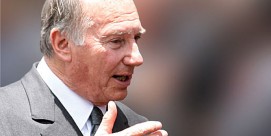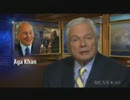Note: Audio is placed below the main text, when available.
Interview of AgaKhan with Lucky Severson on pbs.org 2015-07-31
TV Interview and full transcripts available @ http://www.pbs.org/wnet/religionandethics/2015/07/31/aga-khan-ismaili-mu...
Extended Interview: http://www.pbs.org/wnet/religionandethics/2015/07/31/july-31-2015-aga-kh...
SEVERSON: It is very rare for the Aga Khan to grant interviews. We caught up with him in Toronto:
(speaking to the Aga Khan): You are a spiritual leader, a businessman, treated like a head of state. I think you were just with the prime minister yesterday. Which of those hats are most important to you?
AGA KHAN: The institutional hat, which is the hat I inherited from my grandfather.
SEVERSON: As a spiritual leader?
AGA KHAN: As the Imam of the Ismaili community, by far.
SEVERSON: That is why the AKDN is at work in some of the poorest regions of the world, places, the Aga Khan says, that are ripe for violence and terrorism.
AGA KHAN: Not only does it come from poverty, but frankly in many areas it's predictable. The question is, when did that become explosive, and how do you stop it from becoming explosive?
SEVERSON: How do you do that?
AGA KHAN: Preempting it. Changing the basics of the quality of life and giving people, replacing despair by hope. People are driven by hope.
SEVERSON: And in his view, hope begins with education, one reason his network operates academies and schools for both boys and girls, like this one in Mombasa, [Kenya].
SEVERSON: The AKDN oversees projects ranging from a cardiac surgery and cancer center in Nairobi and a hydropower plant in Uganda. The Ismailis are renowned for their contribution to the arts and Islamic culture, like the new Aga Khan Museum in Toronto, the first art museum in North America devoted to Islamic art and culture.
AGA KHAN: The empires which functioned the best, you had intellectual pluralism, not only ethnic pluralism. You had intellectual pluralism. That is, the best qualified people in society, in medicine, in law, in space sciences, whatever it may be, they came together for the benefit of the community.
SEVERSON: The Aga Khan Trust for Culture creates jobs by restoring ancient holy places, like the Blue Mosque in Cairo and Humayun’s tomb in Delhi.
Aga Khan Award for Architecture Video: "Founded by His Highness the Aga Khan in 1977, the award has established a reputation as one of the most prestigious and coveted prizes in its field..."
SEVERSON: The Aga Khan offers a million-dollar prize for revitalizing architecture. The AKDN helped transform the Al Azhar Park in Cairo from a 500-year-old garbage dump to an oasis of beauty. The Aga Khan says the ethics of his faith guides everything he does.
AGA KHAN: Islam says that we as Muslims have to leave the environment in a better condition than we found it, when we were born. In other words, Allah has entrusted to the human race the duty to improve, work with his creation. And that's why the Aga Khan Trust for Culture is called a Trust, and that's how the ethic of the faith comes into the way you work.
SEVERSON: Are you generally optimistic?
AGA KHAN: No, frankly. No. I would hope that we would see a greater tolerance and greater acceptance of the divisions in society, because I think we are seeing forms of polarization which are very, very unhealthy, indeed.
SEVERSON: How much are you guided by your faith? Is your faith everything?
AGA KHAN: Yes. I wouldn't be guided by anything else. I wouldn't understand that.
SEVERSON: So every minute of your day you are guided by your faith.
AGA KHAN: Well the faith has 1400 years of tradition. It has been exposed to so many different situations that there is practically no human situation unknown to it although science is changing things today.
SEVERSON: Can you give me an example or two of where your ethical framework is at play in some of your projects?
AGA KHAN: Well absolutely. First of all we are concerned about the quality of life and therefore we have to be concerned with the poor. So one of the continuing objectives is to change or eliminate - in so far as is humanly possible - poverty. People who live in conditions which are not acceptable in terms of quality of life, that's clear. The second one is having communities work together. We used to have situations particularly in isolated parts of the world, high mountain areas where different communities were practising a different form of Islam from one village to the other. What we want to do is have those villages work together, accept that there are different interpretations. We always knew right from the time of the revelation of the faith that there were going to be different interpretations. That is not new. What is important is that these different interpretations work together and they apply the same ethical principles re the quality of life. And that is happening. I have to tell you that there are parts of the world where that is happening and is happening successfully.
SEVERSON: Give me an example.
AGA KHAN: Central Asia, high mountain areas, communities who live in villages who have never gone from one village to the next but you will suddenly find that they will share a micro-credit program. They will share the distribution of grain. They will share the knowledge of new commercial activities. And it is inspiring to see how these people come together and work together to improve their quality of lives.
SEVERSON: (Question unknown)
AGA KHAN: I think in many parts of the Christian world you have inherited the Augustinian attitudes towards the division between faith and world. That's in direct contradiction to Islam. We are required to act in our worldly lives in a way which is in keeping within the ethics and premises of Islam. So we are not allowed to make that division. Indeed if we tried or attempted to devote the totality of our lives either to one or the other, that in principle is not acceptable in Islam
SEVERSON: (Question unknown)
AGA KHAN: Generosity is part of our faith. And.so it is an ethical principle for all of us whether you are Shia or Sunni or whatever it may be. So that's intrinsic in the nature of faith for us.
SEVERSON: So.....
AGA KHAN: I mean the basic premise for the wealthy is - you use what you need to live in a dignified manner. What you don't need, you share.
SEVERSON: If religious intolerance and ignorance is one of the reasons we have so much violence, is it up to religions to fix the problem.
AGA KHAN: I wouldn't say it is only up to religion. It is up to social conscience also. The person who doesn't believe in any faith, still has responsibility to society. So I don't think it is an issue of faith exclusively frankly.
SEVERSON: That's why the Aga Khan, who is 78 this year, travels the globe, doing his best to alleviate poverty and practice tolerance.
For Religion & Ethics NewsWeekly I'm Lucky Severson
TV Interview and full transcripts available @ http://www.pbs.org/wnet/religionandethics/2015/07/31/aga-khan-ismaili-mu...
- 12453 reads
 Ismaili.NET - Heritage F.I.E.L.D.
Ismaili.NET - Heritage F.I.E.L.D.
